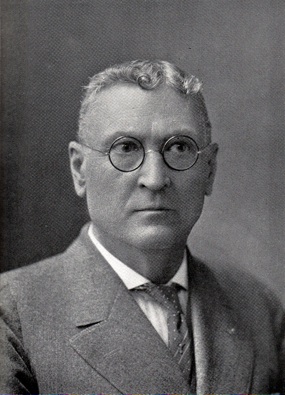MAGLCBurleigh
CHARLES B. BURLEIGH 1862-1931

Deputy Grand Master, 1923
MEMORIAL
From Proceedings, Page 1931-77:
Brother Burleigh was born in Chelsea March 1, 1862, and died in Malden May 6, 1931. At a very early age he entered the service of the American Bell Teiephone Company, which was installing the first exchange in Malden. Fascinated by the new developments in the use of electricity, he devoted himself to the study and practice of electrical engineering and advanced in his profession until he became New England manager of the Central Station Department of the General Electric Company, holding that position until his recent retirement from active business.
During the war with Spain he was in command of the technical division of the Volunteer Electric Corps, having charge of the mining of Boston harbor.
Brother Burleigh became a member of Star of Bethlehem Lodge in 1890 and was its Master in 1897 and 1898. He was a Charter member of The Lodge of Stirling and was its Master while under Dispensation and the first Master under Charter, serving in 1910 and 1911. He was District Deputy for the Seventh Masonic District in 1915 and 1916 by appointment of M.W. Melvin M. Johnson. In 1923 he served as Deputy Grand Master by appointment of M.W. Dudley H. Ferrell.
He was a member of Shekinah Chapter, Naphtali Council, Beauseant Commandery, and the four Scottish Rite Bodies in Boston. He was State Chairman for the George Washington Masonic National Memorial Association in 1920 to 1923, inclusive, and had charge of collecting the contributions to the Association in Massachusetts until the basis of contribution was changed in 1930. He was State Chairman for the Masonic Service Association of the United States in 1922 and 1923.
Brother Burleigh found. in Masonry a ffeld for the gratification of the great desire of his life - to be useful to his fellow men. As another exercise of this quality, he headed a committee for the industrial placement of demobilized soldiers after the World War and was remarkably successful in this work.
He was a member of a large number of scientific, professional, philanthropic, and social organizations, in several of which he was conspicuously useful.
Always genial and sympathetic, never too busy to lend a hand, never deaf to the call to service, he was one of the best loved Masons in our jurisdiction.
His widow and son survive him.
From Proceedings, Page 1932-28:
Death drew her restful curtains round his bed;
And though we call, he will not wake again.
Nor would we wish to wake him if we might;
For he has seen the Unseen face to face.
His work on earth is finished. Who would dare
To call him down again from his high place.
And yet, Oh friends, it is such men as he
That make the earth seem empty when they leave.
Yet not empty, " the sweet remembrance of his virtues shall last" - a happiness of thought in the companionship of which we who knew him will ever find an inspiration.
From boyhood, he found life very real. It was a matter of constant application in order to establish those personal adjustments that would enable him to make a living. And the record of his business affiliations reveals his skill in achieving success. In the various positions which he filled in the years which brought him to the important place he held, until just before his going from us, he displayed an application and an ability, a sense of responsibility and a measure of vision which warranted the confidence imposed in him by his associates and were the explanation of why and how he advanced from year to year to places of greater trust.
In his particular field of endeavor, no one ever more truly earned for himself the respect of his fellow workers than Charlie Burleigh. But life to him was not a matter merely of earning a living, there was a finer substance to be discovered than material stuff, a substance which, when rightly used, produced the immaterial but imperishable riches of satisfaction, contentment happiness. Life to him was a happy, daring adventure in service. We will never think of him and never speak of him without the picture coming before us of this man going out of his way to help his fellow men.
In the knowledge of men there are recorded only a few of the many deeds of kindness he performed. The company of those whose way was made a little smoother by his effort, whose spirits were lifted by his understanding and encouragement, is beyond our ability to number. And we like to think that this genius for unselfishness, this natural skill in friendliness, were somewhat cultivated by his association with the teachings of Masonry.
From the time he was raised in Star of Bethlehem Lodge in 1890, the idealism of our institution was to him a compelling power. He constantly sought its reality and submitted his own ideas and desires to its gentle persuasion. Thus he earned for himself the Mastership of his Lodge and when he was appointed Deputy Grand Master of Masons in Massachusetts in 1923, his brethren rejoiced in his attainment of this high position; for the implications of his honorable title were frilly matched by the honorable reality of his character.
We delight to believe that he has gone on to greater tasks and we have joy in the remembrance that he once walked with us here.
Dudley H. Ferrell
Melvin M. Johnson
Lauren L. McMaster
Committee